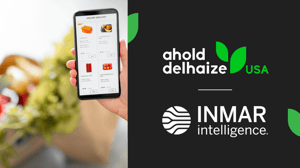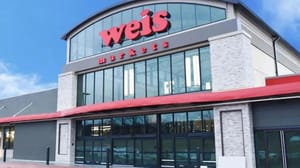Kroger, Ocado Strike Exclusive Deal for U.S. Online Grocery
The partnership will build up to 20 U.S. warehouses for Ocado's proprietary technology in a big bet on e-commerce.
In a deal described as a “huge opportunity to redefine the grocery experience,” Kroger on Thursday said it had come to an exclusive agreement with innovative British retailer Ocado to implement its e-commerce technologies in the U.S. for the first time.
Ocado utilizes automated distribution centers and other proprietary technologies to orchestrate what it called profitable grocery e-commerce in the U.K., where it is a retailer, and in other markets such as France, Sweden and Canada where it has partnered with local grocers to license its technologies.

Ocado
For Kroger, the deal could obviate the need to develop or expand its nascent grocery home-delivery efforts and partnerships with crowdsourced concierge services such as Instacart that use stores as fulfillment centers. However, Kroger made no immediate announcement of how those efforts might be affected by the new partnership.
Online grocery shopping in the U.S. is on an accelerated path to industry saturation, according to figures from Nielsen and the Food Marketing Institute, which earlier this year predicted that consumer online food and beverage spend could reach $100 billion by 2025.
Kroger officials said they were already working with Ocado to identify three sites to locate automated warehouses and would look to open as many as 20 in the coming three years.
The agreement calls for Kroger to subscribe for 33.1 million shares in Ocado, upping its interest in the company to 5%, a stake valued at about $216 million. Kroger will pay monthly exclusivity and consultancy fees, which will offset in part the total fees that are expected to be agreed upon between the parties.
Ocado—which for years has been rumored to look at a U.S. deal, and more recently agreed to provide e-commerce for Sobeys in Canada—said it would discontinue talks with other U.S. entities. In the longer term, Kroger will retain exclusivity in the U.S., conditioned on it meeting unspecified market share targets or ordering an agreed number of distribution depots.
“We see Ocado as an innovative, exciting and transformative partnership in pursuit of our Restock Kroger vision, to serve America through food inspiration and uplift,” Kroger Chairman and CEO Rodney McMullen said in a statement. “We are actively creating a seamless digital experience for our customers. Our partnership with Ocado will speed up our efforts to redefine the food and grocery customer experience—creating value for customers and shareholders alike.”
Ocado’s proprietary approach to grocery e-commerce, known as its Smart Platform, utilizes massive warehouses where hundreds of robots on suspended tracks assemble orders. An efficient hub-and-spoke delivery system allows each warehouse to do about $1 billion in annual sales without upcharging at a cost of about $2 per order—a faster, cheaper and more profitable solution to grocery e-commerce than the prevailing options in the U.S., including click-and-collect, which Kroger currently uses in hundreds of stores, and crowdsourced picking and delivery.
“Ocado's unique, proprietary and industry-leading technology is set to transform the shopping experience of consumers around the world,” Ocado Group CEO Tim Steiner said. “Our success as a retailer shows that we can offer customers unrivaled choice, quality and convenience, efficiently and profitably. The opportunity to partner with Kroger to transform the way in which U.S. customers buy grocery represents a huge opportunity to redefine the grocery experience of Kroger's customers and create value for the stakeholders of both Kroger and Ocado.
“As we work through the terms of the services agreement with Kroger in the coming months, we will be preparing the business for a transformative relationship which will reshape the food retailing industry in the U.S. in the years to come.”
The new relationship is not expected to affect Kroger's earnings per diluted share guidance range for 2018 and 2019, as it is already reflected in the company's Restock Kroger plan.
Ocado said it expects the earnings impact of this announcement to be neutral this year, and said structure of the terms to be agreed with Kroger would be similar to those agreed with France’s Groupe Casino, Canada’s Sobeys Inc. and ICA Group in Sweden. Ocado and Kroger will, however, explore “value-neutral” alternatives to Ocado’s normal fee structure to reduce the initial capital requirements for Ocado compensated by an appropriate reduction in ongoing fees.
Industry observers said the deal could redefine the prevailing approach to U.S. grocery e-commerce, but much may hinge on whether the model utilized in denser European markets can be as efficient in the largely nonurban and automobile-dependent U.S.
“Instacart is a good stepping stone for many U.S. grocers because it lets them quickly sell online, using their existing stores,” said Keith Anderson, SVP of strategy and insight for Profitero. “But there are trade-offs to fulfilling orders from stores versus dedicated, automated distribution centers. Dedicated DCs can be run much more efficiently, perishables are fresher, and online orders don’t disrupt in-store inventory or shopping experience. This is another sign that Kroger is committed to ecommerce, and that delivery, not just click-and-collect, will be a key part of their offering over the next few years.”
Bryan Roberts of the British consultancy TCC Global said the deal was “seismic” for Ocado, which has been anxious to expand to the U.S. for many years.
“The scale of the deal could shake up the current U.S. grocery e-commerce market, offering a step-change in service levels, order accuracy and timeliness,” Roberts said. “But much of the U.S. lacks the benign market drivers that make U.K. grocery e-commerce thrive, like dense populations and low car ownership among city-dwellers. It is likely that the partnership will adopt a city-focused strategy in the fulfilment center roll-out.”
About the Author
You May Also Like






